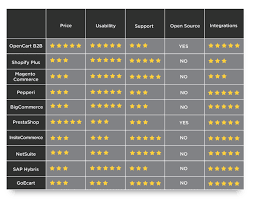The Benefits of B2B Ecommerce Software
In today’s digital age, businesses are increasingly turning to ecommerce solutions to streamline their operations and reach a wider audience. While most people are familiar with business-to-consumer (B2C) ecommerce platforms like Amazon and eBay, the world of business-to-business (B2B) ecommerce is also rapidly expanding.
B2B ecommerce software is specifically designed to cater to the unique needs of businesses selling products or services to other businesses. These platforms offer a range of features and benefits that can help companies improve efficiency, increase sales, and enhance customer satisfaction.
Key Benefits of B2B Ecommerce Software:
- Streamlined Ordering Process: B2B ecommerce software provides a user-friendly interface that allows business customers to place orders quickly and easily.
- Custom Pricing: Companies can set up custom pricing structures for different customers, ensuring that each client receives accurate pricing based on their specific agreements.
- Integration with ERP Systems: Many B2B ecommerce platforms seamlessly integrate with enterprise resource planning (ERP) systems, allowing for real-time inventory updates and order processing.
- Personalised Customer Experience: Businesses can create personalised catalogues, product recommendations, and promotions for each customer based on their purchase history and preferences.
- Data Analytics: B2B ecommerce software provides valuable insights into customer behaviour, sales trends, and inventory management, enabling companies to make data-driven decisions.
- Mobile Compatibility: With the rise of mobile commerce, B2B ecommerce platforms are optimised for mobile devices, allowing business customers to place orders on-the-go.
Overall, investing in B2B ecommerce software can help businesses streamline their operations, improve customer relationships, and drive revenue growth. As the digital landscape continues to evolve, adopting a robust ecommerce solution tailored to the needs of B2B transactions is essential for staying competitive in today’s market.
Understanding B2B Ecommerce Software: Key Features, Integration, and Benefits for Businesses
- What is B2B ecommerce software and how does it differ from B2C ecommerce?
- What are the key features of B2B ecommerce software that businesses should look for?
- How can B2B ecommerce software help businesses streamline their ordering processes?
- Is B2B ecommerce software compatible with existing ERP systems for seamless integration?
- What are the benefits of personalised customer experiences offered by B2B ecommerce software?
What is B2B ecommerce software and how does it differ from B2C ecommerce?
B2B ecommerce software is a specialised platform designed for businesses to sell products or services to other businesses online. It offers features tailored to the unique needs of B2B transactions, such as custom pricing, bulk ordering capabilities, and integration with ERP systems. In contrast, B2C ecommerce platforms cater to businesses selling directly to consumers and focus on features like individual customer accounts, product recommendations based on browsing history, and secure payment gateways. The key difference lies in the target audience and functionality of each type of ecommerce software – B2B platforms are geared towards facilitating complex business transactions between companies, while B2C platforms are optimised for providing a seamless shopping experience for individual consumers.
What are the key features of B2B ecommerce software that businesses should look for?
When considering B2B ecommerce software, businesses should look for key features that are essential for streamlining their operations and enhancing customer experience. Some crucial features to consider include a user-friendly interface for easy order placement, custom pricing capabilities to cater to individual customer needs, seamless integration with ERP systems for efficient inventory management, personalised customer experiences through tailored catalogues and promotions, robust data analytics tools for informed decision-making, and mobile compatibility to enable on-the-go ordering. Prioritising these features can help businesses maximise the benefits of B2B ecommerce software and stay ahead in the competitive market landscape.
How can B2B ecommerce software help businesses streamline their ordering processes?
B2B ecommerce software offers a range of features that can significantly streamline businesses’ ordering processes. By providing a user-friendly interface, companies can enable their business customers to place orders quickly and efficiently. Custom pricing options allow businesses to set up individual pricing structures for different clients, ensuring accurate pricing based on specific agreements. Integration with ERP systems ensures real-time inventory updates and seamless order processing, reducing manual errors and delays. Additionally, personalised customer experiences, data analytics capabilities, and mobile compatibility further enhance the efficiency of the ordering process, enabling businesses to streamline operations and improve overall productivity.
Is B2B ecommerce software compatible with existing ERP systems for seamless integration?
Businesses often inquire about the compatibility of B2B ecommerce software with their existing ERP systems to ensure seamless integration. The good news is that many B2B ecommerce platforms are designed to integrate smoothly with various ERP systems, facilitating real-time data exchange and enhancing operational efficiency. This integration allows businesses to synchronise inventory levels, streamline order processing, and provide accurate pricing information to customers. By leveraging the compatibility between B2B ecommerce software and ERP systems, companies can optimise their business processes and deliver a more cohesive customer experience.
What are the benefits of personalised customer experiences offered by B2B ecommerce software?
Personalised customer experiences offered by B2B ecommerce software bring a multitude of benefits to businesses. By tailoring product recommendations, pricing, and promotions based on each customer’s preferences and purchase history, companies can enhance customer satisfaction and loyalty. This level of personalisation not only fosters stronger relationships with clients but also increases the likelihood of repeat business and higher order values. Additionally, the ability to create custom catalogues for individual customers helps streamline the ordering process and improves overall efficiency. Ultimately, personalised customer experiences provided by B2B ecommerce software play a crucial role in driving sales growth and establishing a competitive edge in the market.

